Like our community, the blog will continue to exist beyond the parameters of this semester. But for the purpose of assessment, it will “close” at midnight on Sunday, December 8. Until that point, any comments or posts contribute to your participation grade for the course, and naturally you may feel free to write about any book from the semester or indeed to reflect on the whole lot of them.
Our class through memes
here’s the link to my meme presentation! https://docs.google.com/presentation/d/14u5WW7H3goQGeDNAVxubjwIfapYKIjgy-TQF8d2cdxg/edit?usp=sharing
Final Project Poem: Universal Themes
Thank you all for such an incredible class this semester. I learned so much from each of you, and I am in absolute awe of your personal strengths and the battles you all courageously face. You are known right where you are.
Your friend, Rachel
Katia’s final project
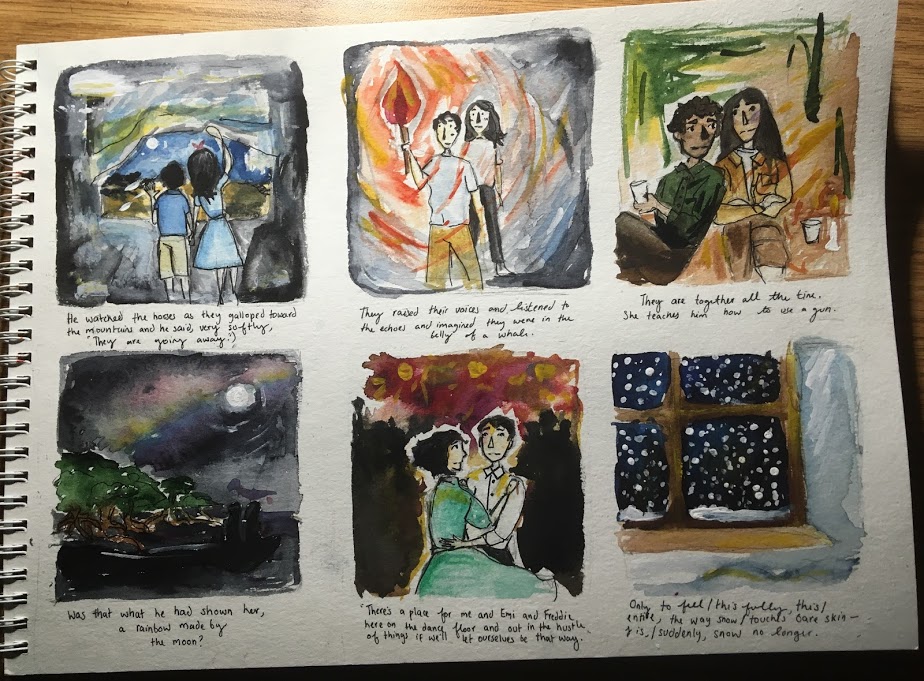
Here’s the illustrations for my final projects. I guess I should have predicted that my final project would come down to the salvation, whether brief or lasting, that we have the capacity to find in each other. I exist, and that’s what matters is a powerful statement. We exist, and that’s what matters is the closest thing, I think, that I presently have to a life philosophy.
I will miss this class so so so much.
“To America: From 353 Asian American Literature” Lyrics
I want to be a dancer, I’m going to be the next Fred Astaire
But you say I can’t, keep my eyes up, and have this evil stare
You made us move, took my father away, tell me will I see him soon
Cause all I have left are these words under my breath, Dad see it, same moon, same moon
We said no-no to fight, with your armies sticks and stones
But even if we have said yes, we would still be dying alone
Oh Kenji was your model, the perfect Japanese American
But even he died with nothing after being disgraced and forsaken
Tell us America, what do you want us to do
To show up on your shores and be accepted by you
What on your God’s name do you want us to do
We’re just trying to survive, because we are humans too
Don’t you forget now, we are humans too.
My life’s been cursed with water, but you never set me free
I still want to go back to those ocean waves, cause here no one is looking for me
I was struggling with my father as we washed up on your shore
But you would’ve marked us as different, suspicious, and kicked us out your door
I’m not a cyborg, but a citizen. I’m a gift to your race.
But you don’t have the care or comfort that I deserve, and I’ve never felt your grace
So sexualize me, I’m a fish in your sea
Just don’t think that you could ever truly generalize me
Tell us America, what do you want us to do
To show up on your shores and be accepted by you
What on your God’s name do you want us to do
We’re just trying to survive, because we are humans too
Don’t you forget now, we are humans too.
I became an ox with nothing, on your angel’s prison sand
Detained on your devil’s pass, this isn’t the America we planned
Oh masculinity will mess up your free land
You should be focused on the people, not the size of your hands
Tell us America, what do you want us to do
To show up on your shores and be accepted by you
What on your God’s name do you want us to do
We’re just trying to survive, because we are humans too
Don’t you forget now, we are humans too.
Finishing Dialogue:
I must say something that I couldn’t put in the song. It wouldn’t have made sense in the lyrics, but I wanted to write it all along. That I’m disappointed and upset, y’all know it makes me whine… about how Fokir from Hungry Tide didn’t live and Kanaii didn’t die. And then on top of that, he didn’t even lose a limb, but he should have because his Grandmother said why be scared of tigers when there’s predators like him. It’s okay, I’m still satisfied and in love with this class. We just all know that Kanaii better thank his lucky…. stars for Piya and his life. Because in the middle of his strife, his masculinity still thrived. While laying weak and helpless on the ground, somehow this high-class naive idiot survived. Oh Ghosh. Thank you for listening, I know I must end for your sake. Good luck on the rest of your finals and have a good break. You all have been great investigators of literature as I had a lot of fun in this class with you all too. Now please let a humbled and honest Joey, not the prostitute, stop ranting and finally say adieu.
Michelle’s Final Project

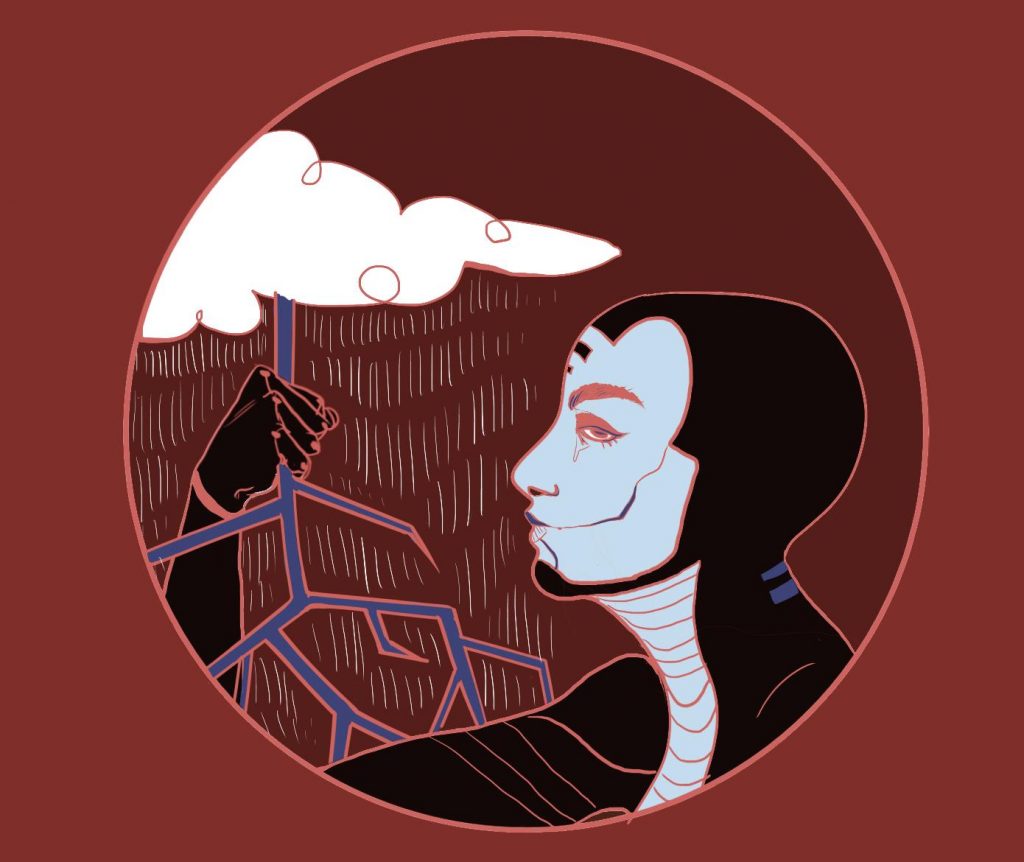
Kenzie’s final project!
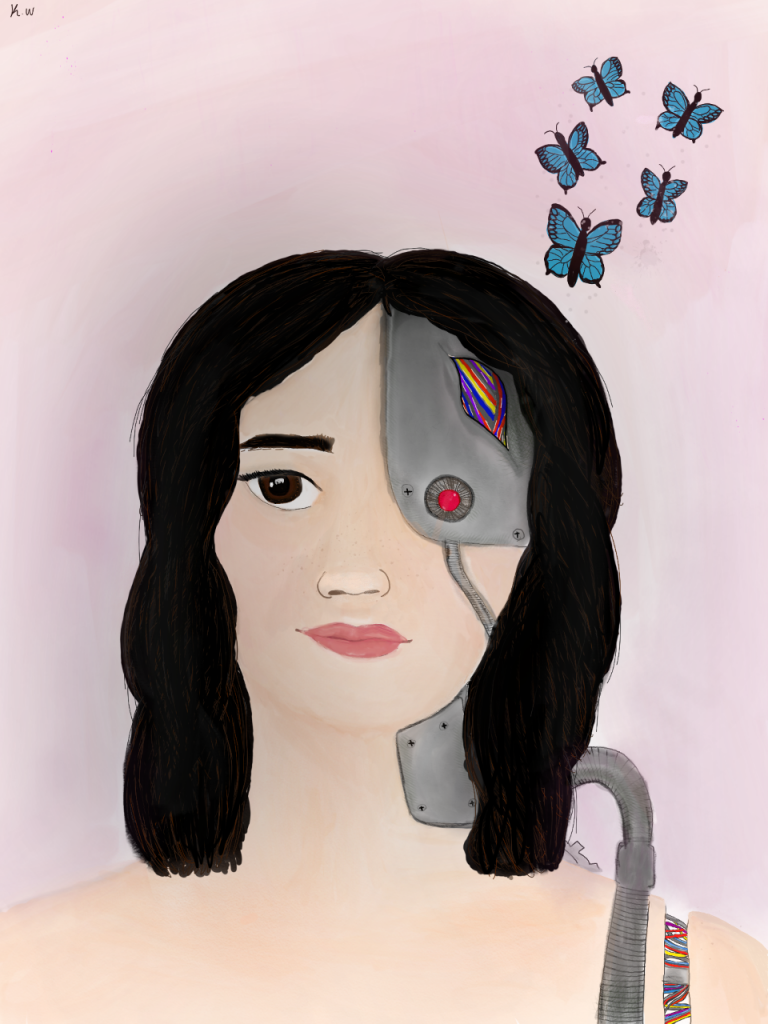
happy finals!!
hello friends, I have done a few digital collages for the final! the process involved a spreadsheet of all the times a given word was used in each book and/or pdf, a doc compiling all of the fragments/phrases/sentences, and a search through creative commons imagery for photographs and paintings that fit the piece! I will cite all of the images used in my collages (bc in this house we Show Artists Respect), and I will leave a guide at the end for the source of each quote.
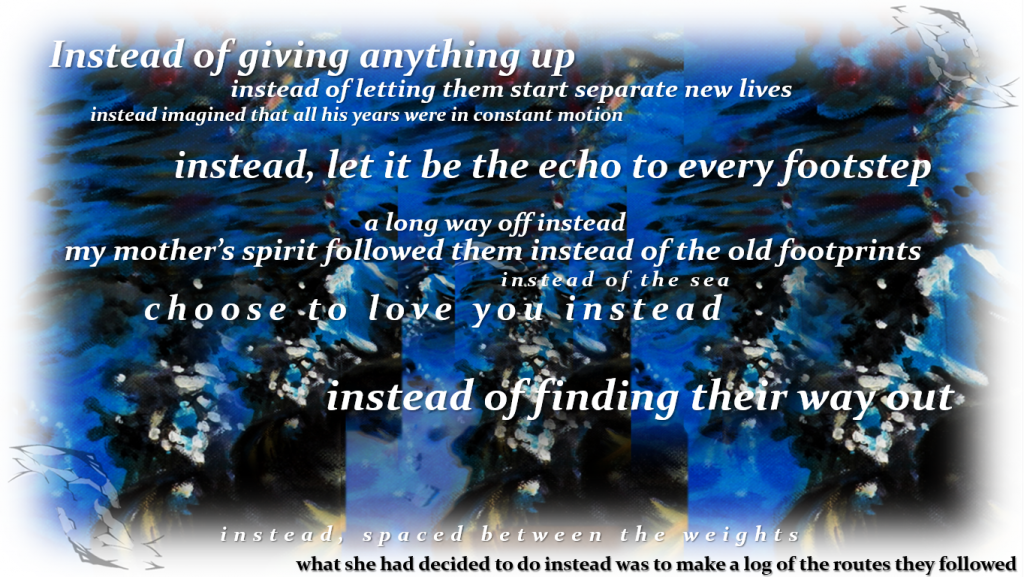
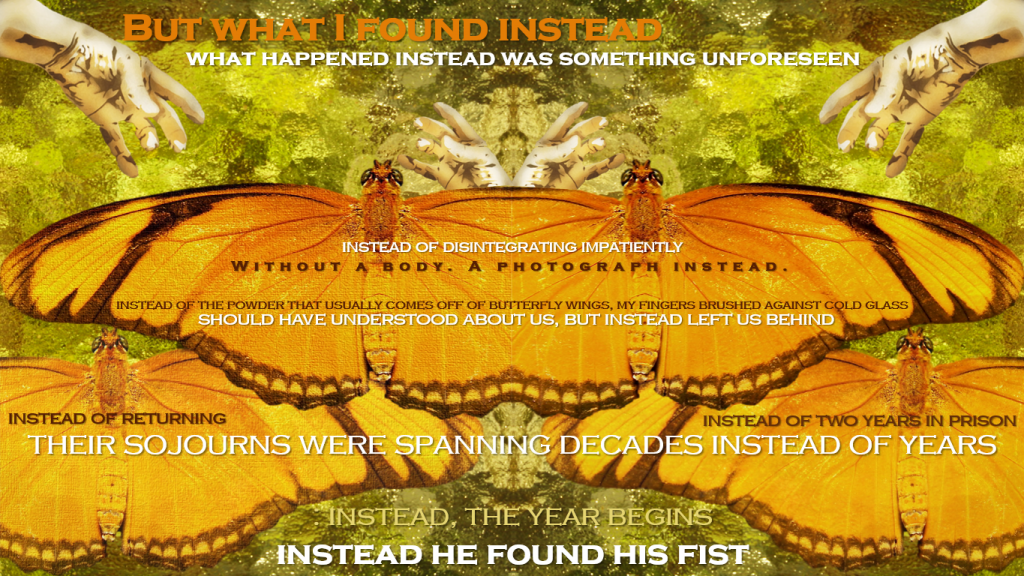
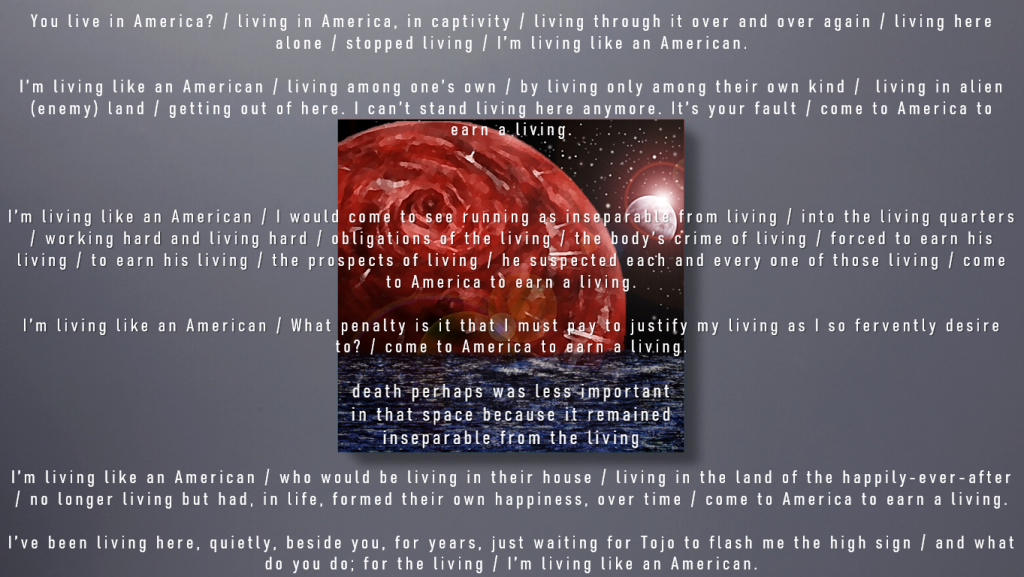
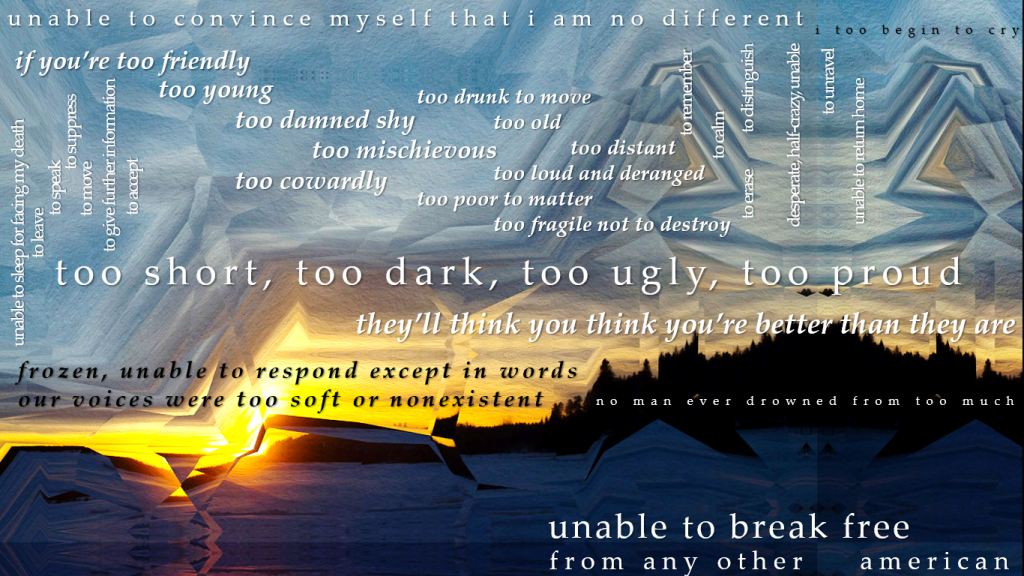
#1: Instead
Chin: Instead of giving anything up, they add on
Kingston: Instead of letting them start separate new lives
Yoon: instead imagined that all his years were in constant motion
Vuong: instead, let it be the echo to every footstep
Okada: a long way off instead
Kingston: my mother’s spirit followed them instead of the old footprints
Yoon: instead of the sea
Hagedorn: choose to love you instead
Ghosh: instead of finding their way out
Ghosh: instead, spaced between the weights
Ghosh: What she had decided to do instead was to make a log of the routes they followed
#2: Instead
Ghosh: But what I found instead
Ghosh: what happened instead was something unforeseen
Okada: instead of disintegrating impatiently
Yoon: Without a body. A photograph instead.
le: Instead of the powder that usually comes off of butterfly wings, my fingers brushed against cold glass
Kingston: should have understood about us, but instead left us behind
Kingston: instead of returning
Okada: instead of two years in prison
Okada: their sojourns were spanning decades instead of years
Vuong: instead, the year begins
Ghosh: instead he found his fist
#3: Living
Hagedorn: You live in America?
Ghosh: living in America, in captivity
Ghosh: living through it over and over again
le: living here alone
Okada: stopped living
Kingston: I’m living like an American.
Kingston: I’m living like an American
Kingston: living among one’s own
Okada: by living only among their own kind
Japanese Internment Poetry: living in alien (enemy) land
Kingston: getting out of here. I can’t stand living here anymore. It’s your fault
Angel Island Poetry: come to America to earn a living
Kingston: I’m living like an American
le: I would come to see running as inseparable from living
Okada: into the living quarters
Okada: working hard and living hard
Okada: obligations of the living
Vuong: the body’s crime of living
Hagedorn: forced to earn his living
Yoon: to earn his living
Hagedorn: the prospects of living
le: he suspected each and every one of those living
Angel Island Poetry: come to America to earn a living.
Kingston: I’m living like an American
Okada: What penalty is it that I must pay to justify my living as I so fervently desire to?
Angel Island Poetry: come to America to earn a living.
Yoon: Death perhaps was less important in that space because it remained inseparable from the living.
Kingston: I’m living like an American
Otsuka: who would be living in their house
Okada: living in the land of the happily-ever-after
Yoon: no longer living but had, in life, formed their own happiness, over time
Angel Island Poetry: come to America to earn a living.
Otsuka: I’ve been living here, quietly, beside you, for years, just waiting for Tojo to flash me the high sign.
Choi: and what do you do; for the living
Kingston: I’m living like an American.
#4: Too/Unable
[horizontal]
Okada: I am unable to convince myself that I am no different [from any other American]
Hagedorn: I too begin to cry
Otsuka: If you’re too friendly [they’ll think you think you’re better than they are]
Okada: too young
Okada: too drunk to move
Kingston: too damned shy
Otsuka: too old
Kingston: too mischievous
Yoon: too distant
Okada: too cowardly
Hagedorn: too loud and deranged
Ghosh: too poor to matter
Chin: too fragile not to destroy
Otsuka: Too short, too dark, too ugly, too proud.
Otsuka: [If you’re too friendly] they’ll think you think you’re better than they are
Ghosh: frozen, unable to respond except in words
Kingston: our voices were too soft or nonexistent
Vuong: no man ever drowned from too much
Hagedorn: unable to break free
Okada: [I am unable to convince myself that I am no different] from any other American
[vertical]
Kingston: unable to sleep for facing my death
Kingston: unable to leave
Okada: unable to speak
Okada: unable to suppress
Otsuka: unable to move
Yoon: unable to give further information
Yoon: unable to accept
Yoon: unable to remember
Yoon: unable to calm
Hagedorn: unable to erase
Yoon: unable to distinguish
Hagedorn: desperate, half-crazy, unable
Ghosh: unable to unravel
Ghosh: unable to return home
Sources for #1:
Renault, Antoine. “Ocean Painting 2014.” Creative Commons. 2 Nov. 2014. https://search.creativecommons.org/photos/485a02d8-ce5e-4006-91bd-f5f14b9bf016.
Takitani, Tony. “Footprints 2.” Creative Commons. 8 May 2010.
https://search.creativecommons.org/photos/3ac5c496-16e1-48e6-ad72-b9ee69ca2318.
Vukoslavovic, Vuk. “black lines.” Creative Commons. 11 Mar. 2014. https://search.creativecommons.org/photos/c470a4a8-ebc9-4fa5-aed3-c1196d870eab.
Sources for #2:
Althouse, Ann. “Butterfly.” Creative Commons. 25 Feb. 2018. https://search.creativecommons.org/photos/6212fffe-7b7b-4d2b-9596-758fd6900600.
Corell, Per. “My hand !” Creative Commons. 15 Jun. 2013. https://search.creativecommons.org/photos/742025c0-6c3f-4e30-9963-379024172cee.
“Glass.” Creative Commons. 2 Mar. 2007. https://search.creativecommons.org/photos/bc617916-c5b0-421f-8ca5-c7deed2cf087.
Sources for #3:
Allen, Huw. “Fantasy Work.” Creative Commons. 2014. https://search.creativecommons.org/photos/6a543899-f3b5-4888-a326-2eb5b5b16252.
C100 Studio. “The Art of Rebellion III.” Creative Commons. https://search.creativecommons.org/photos/47fe9321-1183-4619-b131-8dde8b16df28.
Rao, Varun N. “Palette Knife Acrylic Painting – Thailand.” Creative Commons. 27 May 2019. https://search.creativecommons.org/photos/0c817cac-2e9a-4133-9ef0-388287bcfb65.
Source for #4:
Laakso, Tero. “Winter Sunset (Digital painting).” Creative Commons, 17 Feb. 2016. https://search.creativecommons.org/photos/5e76a9c9-fd35-49d3-9d9b-8ecdb913602b.
HotOrNot? Syllabus edition
***hi Dr. Scanlon this is just a creative title, I am not attacking your reading selection****
Okay, so I am wrapping up my second literary analysis essay on my FAVORITE book we read this semester, The Gangster We Are All Looking For. I really appreciate how le showed how the trauma the girl faces from Ba and from dislocation affects how she handles her adult life and her overall outlook. Comparatively, I didn’t really connect with Once the Shore or The Hungry Tide as personally as I did with le’s book.
This got me thinking as to what was everyone’s favorite (or least favorite) work we read this semester? Add your thoughts below!
La Misma Luna
So this doesn’t really have anything to do with Asian American Literature but I have a movie recommendation if anyone is interested.
The film is an indie Mexican-American drama that came out in 2007 called “La misma luna”, which translates to “the same moon.” The title it was released under in the US is “Under the Same Moon.” It is honestly one of my favorite movies and I think everyone might really enjoy it.
It stars Kate del Castillo and Eugenio Derbez both of whom have started to grow in popularity in the US in recent years. This is the description from IMDb: “A young Mexican boy illegally travels to the U.S. to find his mother (who is illegally in the U.S.) after his grandmother passes away.”
I meant to post about this movie when we first started talking about the “same moon” quote but I totally forgot until today! The boy’s story reminded me a lot of Carlitos ‘s in the movie, especially in the discussion of separation from parents when you’re young. It makes me cry every time I watch it so I definitely recommend and believe it is worth a watch!
The Haibun
One of the poems in the Vuong book is titled an Immigrant Haibun and I wanted to talk a little bit about that form of writing. I didn’t know the haibun was thing until this semester, when my Flash Forms class introduced us to haibuns (and even used Vuong’s poem as an example of the form…of the haibuns we read, his was one of my favorites).
A haibun is hybrid of prose and haiku. Generally, there is a paragraph or two of prose, written in a imaginistic/poetic style, which is followed by a haiku. Haibuns also usually involve a journey of some sort and mention a season. Obviously, those are generalized guidelines, not everyone sticks to those rules, as you can see in Vuong’s piece. It’s a weird piece to write, because it is such a combination of prose and poetry and the writer has to decide how to approach it–prose first, then haiku, the opposite, a combination of both, etc.
https://poets.org/text/more-birds-bees-and-trees-closer-look-writing-haibun
https://contemporaryhaibunonline.com/
The links are to sites about haibuns. The first is describing/explaining the art form in more detail, the second is a site/journal of haibun poems, in case anyone was interested and wanted to know/read more.
